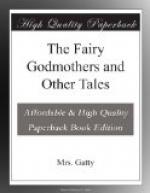“I shall not follow your example,” observed Euphrosyne, “I don’t at all like that notion of the necessity of envy to make the beauty’s joy complete. Besides, I’m not at all sure beauty is not much more charming in idea than in possession. Nobody spend their lives in entering a ball-room, and one gets sadly tired of one’s own face. I’m sure I do, beautiful as it is;” and as she spoke the Fairy stooped over a clear tide pool which mirrored her lovely countenance; “and yet look what a nose I have! It is absolutely exquisite! And this hair!” and she held up her long silken curling tresses and looked at them reflected in the water as she spoke. A musical laugh rang through the fairy group. Euphrosyne resumed her seat. “There isn’t a mortal damsel in the world who would not go into raptures to resemble me,” pursued she, “and yet—but, oh dear, I am getting quite prosy, and it is quite useless, for Ianthe has decided. I, on the contrary, am thinking of something far less romantic and interesting, but I suspect far more necessary to the happiness of mortals than beauty—I mean riches.”
“Men are horribly fond of them, certainly,” observed the Fairy from behind, whose name was Ambrosia. “I can’t endure men on that very account. Look at the grubby wretched lives they lead in counting-houses and banks, and dreadful dingy holes and corners of great towns, where we wouldn’t set the soles of our feet, and this for forty or fifty years, perhaps, in order that in the fifty-first, or perhaps later still, they may turn into butterflies for the little bit of life that is left to them. And such butterflies, too! not knowing what to do with their gay coats and fine wings when they get them at last.”
“I think you are putting an extreme case,” observed Euphrosyne. “Though the grubs themselves may not thoroughly enjoy the riches they have so laboriously acquired, their children or grandchildren may, and live at ease and enjoy them. I should not think of bestowing great riches on uneducated paupers. But it is another matter to give them to people whom education has refined, and who would know how to enjoy and employ them.”
“I wonder,” suggested a very little Fairy, scarcely grown to her full size, “why you don’t just give your Godchildren moderate good health, and enough money to make them quite comfortable without puzzling them?”
“You are a complete Solomon,” observed Euphrosyne, “but you must know, my dear, that moderate good health and a mere comfortable competency would hardly be considered Fairy gifts by our friends in the lower world. These things are, as it were, the absolute necessities of a happy life; they are the beef and mutton (to borrow an earthly simile) of the entertainment. Fairy gifts form the somewhat unnecessary (and questionably wholesome) second course, the sweets, the bonbons, the luscious luxuries of the repast.




